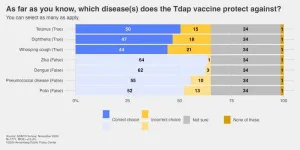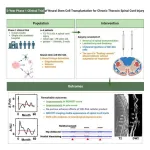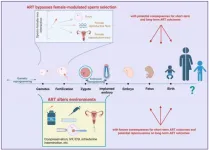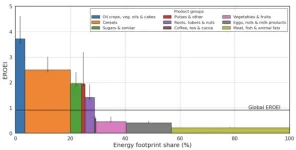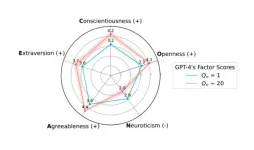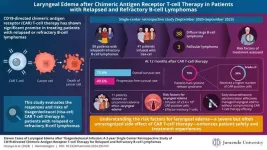Announcing the 2024 Mcknight Brain Research Foundation Innovator Awards in Cognitive Aging and Memory Loss
Janine Kwapis, PhD (Pennsylvania State University) and Sanaz Sedaghat, PhD (University of Minnesota) each receives $750,000 to lead transformative research in the field of cognitive aging
2024-12-17
(Press-News.org)
NEW YORK CITY and ORLANDO— The American Federation for Aging Research (AFAR) and the McKnight Brain Research Foundation (MBRF) are pleased to announce the 2024 recipients of The McKnight Brain Research Foundation Innovator Awards in Cognitive Aging and Memory Loss: Janine Kwapis, PhD, of Pennsylvania State University, and Sanaz Sedaghat, PhD, of the University of Minnesota.
Now in its fourth year, the Innovator Awards provide funding to research scientists pursuing groundbreaking studies in the field of cognitive aging.
Janine Kwapis, PhD, is an Assistant Professor and Paul Berg Early Career Professor in Biology at Pennsylvania State University. Dr. Kwapis’ project, “Improving cognitive flexibility in old age by fixing the transcriptome within memory cells”, aims to better understand the molecular and cellular mechanisms that support the memory updating process. Most human memories are updates, changes to things we have already learned. Although there is evidence that aging individuals across species have difficulty updating memories, we know very little about the mechanisms that underlie this decline.
Sanaz Sedaghat, PhD, is an Assistant Professor at the University of Minnesota. Dr. Sedaghat’s project, “Biological Aging Clock: A Tool to Differentiate Cognitive Aging Trajectories”, aims to study whether biological aging can predict different paths of cognitive decline. Dr. Sedaghat’s lab is developing “protein-based aging clocks” that use protein data to measure a person’s biological age, which can differ from their actual age. By studying these clocks, her research hopes to identify who might be at risk for faster cognitive decline, which could help in developing ways to slow down the process and improve quality of life.
Dr. Kwapis and Dr. Sedaghat will each receive three-year awards of $750,000. The successful program has already supported six investigators in previous years. This year, MBRF renewed its commitment with a $4,626,500 award to AFAR to expand the network of investigators who focus their research on cognitive aging and memory loss.
“The Innovator Awards underscore the McKnight Brain Research Foundation’s commitment to identifying and rewarding the outstanding scientists leading groundbreaking cognitive aging research,” said Michael L. Dockery, MD, Chair of the McKnight Brain Research Foundation. "With Dr. Kwapis and Dr. Sedaghat already demonstrating a strong commitment to the field, we are excited to support their work to better understand and prevent the effects of age-related cognitive decline and memory loss and hope their findings move us closer to our ultimate goal of helping people maintain their brain and cognitive health later in life.”
“In their first four years, the McKnight Brain Research Foundation Innovator Awards have supported an impressive roster of talent who are making great advances in the field of cognitive aging,” notes Stephanie Lederman, EdM, Executive Director, AFAR. “AFAR is pleased to continue our partnership with the McKnight Brain Research Foundation and is proud to support these inspiring investigators, continuing our long support of promising research on cognitive health and healthy aging.”
Learn more about The McKnight Brain Research Foundation Innovator Awards in Cognitive Aging and Memory Loss here.
###
About AFAR
The American Federation for Aging Research (AFAR) is a national non-profit organization that supports and advances pioneering biomedical research that is revolutionizing how we live healthier and longer. For more than four decades, AFAR has served as the field’s talent incubator, providing $212,500,000 to 4,460 investigators at premier research institutions to date—and growing. In 2024, AFAR expects to provide approximately $12,270,00 to 60 investigators. A trusted leader and strategist, AFAR also works with public and private funders to steer high quality grant programs and inter-disciplinary research networks. AFAR-funded researchers are finding that modifying basic cellular processes can delay—or even prevent—many chronic diseases, often at the same time. They are discovering that it is never too late—or too early—to improve health. This groundbreaking science is paving the way for innovative new therapies that promise to improve and extend our quality of life—at any age. Learn more at www.afar.org
About the McKnight Brain Research Foundation
Founded in 1999, the McKnight Brain Research Foundation is the nation’s only private foundation devoted exclusively to discovering the mysteries of the aging brain. Over the past two decades, the Foundation has funded more than $200 million in research specifically targeting cognitive aging and age-related cognitive decline and memory loss through direct contributions and strategic initiatives in partnership with the four McKnight Brain Institutes and the National Institute on Aging through the Foundation for the National Institutes of Health. Learn more about the Foundation at: www.mcknightbrain.org.
END
ELSE PRESS RELEASES FROM THIS DATE:
2024-12-17
Despite national medical guidelines supporting the use of antiviral medications in young children diagnosed with influenza, a recent study reports an underuse of the treatment.
“Antiviral Use Among Children Hospitalized with Laboratory-Confirmed Influenza Illness: A Prospective, Multicenter Surveillance Study” was published in Clinical Infectious Diseases, the flagship journal of the Infectious Diseases Society of America.
Flu illness accounts for up to 10% of all pediatric hospitalizations during ...
2024-12-17
Hematopoietic progenitor kinase 1 (HPK1), a member of the Ste20 serine/threonine kinases family, negatively regulates T cell function and is considered a promising target for immunotherapy. Despite the promising efficacy demonstrated in preclinical models, no HPK1 inhibitors are currently approved for clinical use, due to challenges including balance between kinase selectivity and pharmacokinetic properties.
CAMBRIDGE, Mass., Dec 17, 2024 --- Insilico Medicine (“Insilico”), a clinical-stage generative artificial intelligence (AI)-driven drug discovery company, is proud to announce its latest AI-powered ...
2024-12-17
PHILADELPHIA – Following a several-year lull during the pandemic, cases of whooping cough are increasing across the United States. As of Nov. 30, early U.S. data show over 28,000 cases reported this year, or six times as many as in the same period in 2023, according to the Centers for Disease Control and Prevention (CDC).
Whooping cough or pertussis, a highly contagious bacterial infection of the respiratory tract, was one of the most common childhood diseases in the 20th century and a major cause ...
2024-12-17
A Phase I clinical trial led by researchers at University of California San Diego School of Medicine has demonstrated the long-term safety and feasibility of neural stem cell transplantation for treating chronic spinal cord injuries. These devastating injuries often result in partial or full paralysis and are currently incurable. The study, which followed four patients with chronic spinal cord injuries for five years, found that two patients showed durable evidence of neurological improvement after treatment with neural stem cell implantation, including increased ...
2024-12-17
The domestication of plants and animals has played a key role in the development of human societies. And microbes, too, have been tamed: a study by UNIL, published in the journal Nature Communications, shows that the bacteria used to produce Gruyère, Emmental and Sbrinz cheese show signs of ancient domestication.
The domestication of livestock and plants marked an important stage in the settlement of human populations in the Neolithic period, as they moved from a hunter-gatherer lifestyle to a subsistence model based on animal husbandry and agriculture. Because of the microscopic size and virtual absence of fossils ...
2024-12-17
A Perspective summarizes the risks of bypassing natural selection when using assisted reproductive technologies (ART) in humans and livestock. The authors call for dialogue between the fields of assisted reproduction and evolutionary biology.
Jonathan P. Evans and Francisco Garcia-Gonzalez detail how techniques used in ART, including in vitro fertilization, artificial insemination, and intracytoplasmic sperm injection, can stress and damage gametes and embryos and lead to deleterious epigenetic changes in offspring. Some ART techniques also bypass a system of filters in the female reproductive tract that select healthy sperm and may lead to better genetic matches with ...
2024-12-17
Almost three quarters of adolescents in Australia experience clinically significant depression or anxiety symptoms, with most being chronic, according to a new study. And preventive strategies outside our clinics are urgently required to address this considerable public health problem facing the nation.
The research, led by Murdoch Children’s Research Institute (MCRI) and published in The Lancet Psychiatry, found mental health problems were frequently chronic with 64 per cent reporting symptoms three or more times across their adolescent years.
MCRI Dr Ellie Robson said the rate and ...
2024-12-17
A primary output of agriculture is food, an energy source for the human body. But agriculture also requires energy inputs. Kajwan Rasul and colleagues calculated the global energy return on investment for agriculture over time from 1995 to 2019. The authors constructed a model using two existing models, one that captures the energy use of agriculture and food processing and another that captures flows of agricultural commodities. The authors find that the return on energy investment for global agriculture has increased from .68 to .91 over ...
2024-12-17
Most major large language models (LLMs) can quickly tell when they are being given a personality test and will tweak their responses to provide more socially desirable results—a finding with implications for any study using LLMs as a stand-in for humans. Aadesh Salecha and colleagues gave LLMs from OpenAI, Anthropic, Google, and Meta the classic Big 5 personality test, which is a survey that measures Extraversion, Openness to Experience, Conscientiousness, Agreeableness, and Neuroticism. Researchers have given ...
2024-12-17
Chimeric antigen receptor (CAR) T-cell therapy is a type of cancer immunotherapy where patients’ T-cells are collected and genetically modified to produce chimeric antigen receptors that recognize specific targets on cancer cells, allowing these T-cells to locate and destroy the cancer cells. CAR T-cell therapy shows promising results in treating relapsing or refractory B-cell lymphomas. To explore the risks associated with CAR T-cell therapy, researchers from Juntendo University, Japan, including Professor Jun Ando, Professor Miki Ando, and Dr. Erina Hosoya, published a study in Haematologica on October 17, 2024.
Elaborating about this study further, Dr. Hosoya, ...
LAST 30 PRESS RELEASES:
[Press-News.org] Announcing the 2024 Mcknight Brain Research Foundation Innovator Awards in Cognitive Aging and Memory Loss
Janine Kwapis, PhD (Pennsylvania State University) and Sanaz Sedaghat, PhD (University of Minnesota) each receives $750,000 to lead transformative research in the field of cognitive aging




